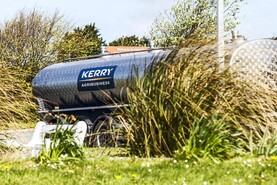Airing their grievances at a meeting with the Joint Committee on Agriculture, Food and the Marine yesterday (Thursday), members of the Organic Farmers Representative Body called for reduced certification rates charged by organic certification bodies. They also welcomed a suggestion that the number of organic certification bodies in Ireland be reduced.
The voluntary body, set up in 2010 to lobby on behalf of farmers in the sector, was chaired by Padraic Finnegan who listed the average certification rates for organic farmers based on the inspection costs of the two largest organic certification bodies in the country, the Irish Organic Farmers and Growers Association (IOFGA) and the Organic Trust.
Finnegan expressed dissatisfaction with the high rates and asked why the Department of Agriculture could not do this work itself in order to lessen the cost burden on organic farmers. The rates given for certification over the five-year organic scheme contract period were as follows:
A farmer with 12ha pays €2,200 to the bodies over the five-year period.A farmer with 30ha pays €3,000 to the bodies over the five-year period.A farmer with 50ha pays €3,100 to the bodies over the five-year period.Finnegan said the rates are “absolutely scandalous” and that the Department needs to more clearly outline the role of the certification bodies, whom, he said, also collect certification fees from marts, co-ops and factories.
He said anything between 9% and 25% of the Organic Farming Scheme payment is paid back to those bodies over the five years for certification purposes. He also questioned the disproportionate jump in rates between the 12ha and 30ha farm and the 30ha and 50ha farm.
Certification and inspections
Under current EU regulations, organic producers have to host an annual inspection on their farm in order to have their organic certification renewed. As these inspections are currently carried out by private certification bodies, farmers pay for the inspections on an annual basis. However, in June this year most Member States voted in favour of a package of organic farming reform proposals, which included a compromise that would allow inspections to be targeted over two years for compliant or low-risk organic producers, thereby lessening the costs to farmers. The vote paved the way for a possible deal by the year's end but so far no specific action has been taken.
Although Ireland voted in favour of the change, before the vote Minister for Agriculture Simon Coveney labelled some of the proposals in the reform package as "too ambitious".
Cost of certification "exceptionally high"
Finnegan's comments were received with surprise by the Oireachtas Committee members, who observed that the cost of certification seems “exceptionally high”.
Independent Senator Mary Ann O’Brien suggested that the five private organic certification bodies in Ireland be streamlined into one public body, a suggestion welcomed by the lobbying group. She also suggested that Bord Bia take on the role of inspecting and certifying organic farms as part of its free Quality Assurance Scheme inspections, which take place every 18 months.
Re-convening
Based on what it heard at the meeting, which included the difficulties for smaller hectare organic farmers due to the introduction of double funding across both GLAS and the Organic Farming Scheme, the Oireachtas Commitee proposed to re-convene with the organic farmers body at a later date. It also said representatives from the Department of Agriculture, Bord Bia and the organic certification bodies should be present.
IOFGA refused to comment to the Irish Farmers Journal on the rates it charges for organic certification. Helen Scully of the Organic Trust says she is awaiting a transcript of this meeting and, therefore, is not in a position to respond at this time.
Organic farming in Ireland
Currently, 2% of land in Ireland is farmed organically, a figure well below the European average of 6%. In the Government’s Food Harvest 2020 strategy, announced in 2010, a target was set of increasing the percentage of land under organic use to 5% from its then level of 1.1%.
The Government admitted that the target was ‘‘ambitious’’, which the Organic Farmers Representative Body says is a “considerable understatement in light of the fact that the target requires an increase in organic land use to over three times its present level in a relatively short period."
Read more: 870 farmers have applied for the new Organic Farming Scheme
Airing their grievances at a meeting with the Joint Committee on Agriculture, Food and the Marine yesterday (Thursday), members of the Organic Farmers Representative Body called for reduced certification rates charged by organic certification bodies. They also welcomed a suggestion that the number of organic certification bodies in Ireland be reduced.
The voluntary body, set up in 2010 to lobby on behalf of farmers in the sector, was chaired by Padraic Finnegan who listed the average certification rates for organic farmers based on the inspection costs of the two largest organic certification bodies in the country, the Irish Organic Farmers and Growers Association (IOFGA) and the Organic Trust.
Finnegan expressed dissatisfaction with the high rates and asked why the Department of Agriculture could not do this work itself in order to lessen the cost burden on organic farmers. The rates given for certification over the five-year organic scheme contract period were as follows:
A farmer with 12ha pays €2,200 to the bodies over the five-year period.A farmer with 30ha pays €3,000 to the bodies over the five-year period.A farmer with 50ha pays €3,100 to the bodies over the five-year period.Finnegan said the rates are “absolutely scandalous” and that the Department needs to more clearly outline the role of the certification bodies, whom, he said, also collect certification fees from marts, co-ops and factories.
He said anything between 9% and 25% of the Organic Farming Scheme payment is paid back to those bodies over the five years for certification purposes. He also questioned the disproportionate jump in rates between the 12ha and 30ha farm and the 30ha and 50ha farm.
Certification and inspections
Under current EU regulations, organic producers have to host an annual inspection on their farm in order to have their organic certification renewed. As these inspections are currently carried out by private certification bodies, farmers pay for the inspections on an annual basis. However, in June this year most Member States voted in favour of a package of organic farming reform proposals, which included a compromise that would allow inspections to be targeted over two years for compliant or low-risk organic producers, thereby lessening the costs to farmers. The vote paved the way for a possible deal by the year's end but so far no specific action has been taken.
Although Ireland voted in favour of the change, before the vote Minister for Agriculture Simon Coveney labelled some of the proposals in the reform package as "too ambitious".
Cost of certification "exceptionally high"
Finnegan's comments were received with surprise by the Oireachtas Committee members, who observed that the cost of certification seems “exceptionally high”.
Independent Senator Mary Ann O’Brien suggested that the five private organic certification bodies in Ireland be streamlined into one public body, a suggestion welcomed by the lobbying group. She also suggested that Bord Bia take on the role of inspecting and certifying organic farms as part of its free Quality Assurance Scheme inspections, which take place every 18 months.
Re-convening
Based on what it heard at the meeting, which included the difficulties for smaller hectare organic farmers due to the introduction of double funding across both GLAS and the Organic Farming Scheme, the Oireachtas Commitee proposed to re-convene with the organic farmers body at a later date. It also said representatives from the Department of Agriculture, Bord Bia and the organic certification bodies should be present.
IOFGA refused to comment to the Irish Farmers Journal on the rates it charges for organic certification. Helen Scully of the Organic Trust says she is awaiting a transcript of this meeting and, therefore, is not in a position to respond at this time.
Organic farming in Ireland
Currently, 2% of land in Ireland is farmed organically, a figure well below the European average of 6%. In the Government’s Food Harvest 2020 strategy, announced in 2010, a target was set of increasing the percentage of land under organic use to 5% from its then level of 1.1%.
The Government admitted that the target was ‘‘ambitious’’, which the Organic Farmers Representative Body says is a “considerable understatement in light of the fact that the target requires an increase in organic land use to over three times its present level in a relatively short period."
Read more: 870 farmers have applied for the new Organic Farming Scheme






 This is a subscriber-only article
This is a subscriber-only article










SHARING OPTIONS: